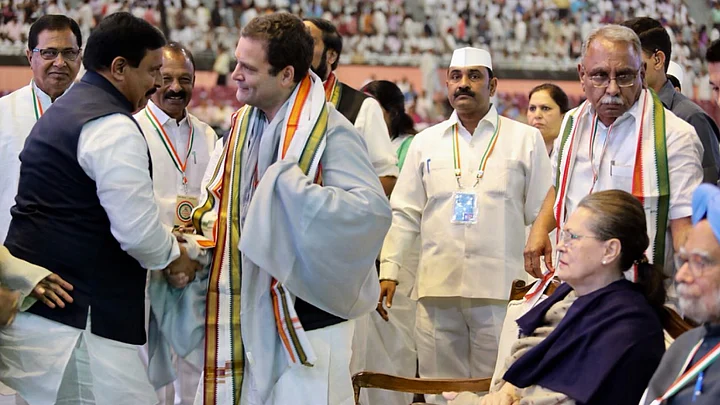In its economic resolution, moved on the second day of the 84th Congress plenary session in New Delhi on 18 March, the party claimed that the BJP’s most “colossal failure” had been its “mismanagement of the economy”. It claimed that the Modi government had squandered a “golden opportunity” when the latter could have “catapulted India’s economic growth to a new high through a near-perfect alignment of stars”.
Here are some of the key excerpts from the economic resolution:
Indian Economy ‘De-Coupled’ Itself From the World Economy
The Congress’ economic resolution stated that “the abysmal economic management of the Modi government” has resulted in a lack of jobs for millions of India’s youth, stagnant real incomes for hundreds of millions of farmers, the collapse of the manufacturing sector, and destruction of micro, small and medium businesses – among a litany of other problems.
The Modi government, it claimed, had been severely indicted in its own Annual Economic Survey for 2017-18, which states:
Different Economic Philosophies
The Congress claimed that it is a party which believes in the twin goals of inclusive economic growth through private enterprise, a competitive and viable public sector, and a robust social safety net through a strong welfare state.
The BJP, it claimed, believes in a coercive economic regime that favours a few, a trickle-down effect for the middle class, and leaving the very poor to fend for themselves.
Demonetisation Was Ill-Thought-Out
The Congress stated that the “demonetisation” experiment of November 2016 would rank as one of contemporary India’s most ill-thought-out and reckless economic misadventures. It claimed that the Modi government had no rationale for this arbitrary policy – since it neither eliminated “black money” nor transform our nation into a utopian “cashless” society as proclaimed by Modi.
Opposed to Shape Given to GST
The Congress claimed that while it supports the GST in principle, it opposes the shape and form given to it by the Modi government.
It said that when conceived by the UPA, GST was a ‘Good and Simple Tax’ with one tax rate (not exceeding 18 percent) and exemptions for merit goods. The Modi government’s GST, it said, is an extremely complex tax structure and violates the principle of cooperative federalism through imposition of cesses outside the GST framework.
A Paralysed Banking Sector
The Congress stated that the starting point of the banking crisis was the unwarranted criticism of the telecom, coal and power sector policies of the UPA government that was trumpeted by the BJP. That, it claimed, had inevitably brought many telecom and power sector enterprises to the brink of bankruptcy.
As a result, gross non-performing assets of the banking sector have trebled since 2013-14.
On Income Inequality
The Indian National Congress, in its resolution, acknowledged that income inequality is a global challenge confronting all modern economies.
The resolution pointed to recent research by economists Thomas Piketty and Lucas Chancel that has documented that individual income inequality in India has widened significantly in the last three years.
The party also stated that the position of north-eastern States that have suffered historical disadvantages and were recognised by the UPA as special category States, has become worse after the Planning Commission was replaced by NITI Aayog.
Prevailing Agrarian Distress
The party stated that farmer suicides are rising at a rate of 50 percent.
Agricultural growth, said the resolution, has been at an anaemic 2.7 percent during the the Modi government compared to 4 percent growth during the entire ten years of UPA. The UPA government had also waived nearly Rs 72,000 crore of farmers’ loans. Minimum Support Prices for paddy, wheat, arhar, sugarcane, etc. increased 2.5 – 3 times during UPA’s 10-year tenure.
On Languishing Exports
Under the Modi government, claimed the resolution, India’s exports have fallen from USD 314 billion in 2013-14 to USD 275 billion in 2016-17 – a total decline of nearly 13 percent. This can be contrasted with the growth in India’s exports from USD 64 billion in 2003-04 to USD 314 billion in 2013-14 – a growth of nearly 400 percent in total or 20 percent every year under the UPA, said the resolution.
Lack of Jobs For Youth
According to the Congress’ resolution, instead of crafting policies that will create jobs, the Modi government has chosen to live in denial of India’s job problem, hiding behind a façade of compromised research, claiming that the economy generates more formal sector jobs than any other country in the world.
The Labour Policy adopted by the BJP-ruled Central and State governments – the resolution stated – is crafted in such a way which totally ignores the interest of the labour and working class.
On Modi Government’s Broken Promises
The Congress, in its resolution, pointed out that none of the promises of the BJP in the run-up to the Lok Sabha election of 2014 have been fulfilled. It was promised that the black money stashed abroad would be brought back to India and Rs 15 lakh would be credited to the bank account of every Indian. The promise that 2 crore jobs would be created every year has also not been done, said the resolution.
(At The Quint, we question everything. Play an active role in shaping our journalism by becoming a member today.)
